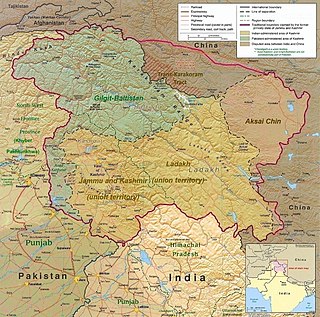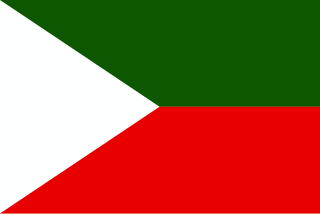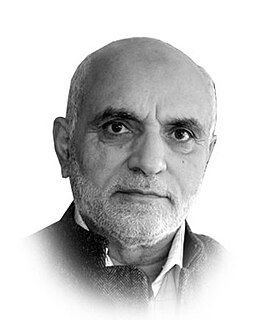Related Research Articles

The insurgency in Jammu and Kashmir, also known as the Kashmir insurgency or Kashmir intifada, is an ongoing separatist militant insurgency against the Indian administration in Jammu and Kashmir, a territory constituting the southwestern portion of the larger geographical region of Kashmir, which has been the subject of a territorial dispute between India and Pakistan since 1947.

The Jammu Kashmir Liberation Front (JKLF) is a militant separatist organization active in both the Indian-administered and Pakistani-administered territories of Kashmir. It was founded by Amanullah Khan, with Maqbool Bhat also credited as a co-founder. Originally a militant wing of the Azad Kashmir Plebiscite Front, the organization officially changed its name to the Jammu Kashmir Liberation Front in Birmingham, England on 29 May 1977; from then until 1994 it was an active Kashmiri militant organization. The JKLF first established branches in several cities and towns of the United Kingdom and other countries in Europe, as well as in the United States and across the Middle East. In 1982, it established a branch in the Pakistani-administered territory of Azad Jammu and Kashmir, and by 1987, it had established a branch in the Indian-administered Kashmir Valley.

The Kashmir conflict is a territorial conflict over the Kashmir region, primarily between India and Pakistan, with China playing a third-party role. The conflict started after the partition of India in 1947 as both India and Pakistan claimed the entirety of the former princely state of Jammu and Kashmir. It is a dispute over the region that escalated into three wars between India and Pakistan and several other armed skirmishes. India controls approximately 55% of the land area of the region that includes Jammu, the Kashmir Valley, most of Ladakh, the Siachen Glacier, and 70% of its population; Pakistan controls approximately 35% of the land area that includes Azad Kashmir and Gilgit-Baltistan; and China controls the remaining 20% of the land area that includes the Aksai Chin region, the mostly uninhabited Trans-Karakoram Tract, and part of the Demchok sector.

India–Pakistan relations refer to the bilateral relations between the Republic of India and the Islamic Republic of Pakistan. The relations between the two countries have been complex and largely hostile due to a number of historical and political events. Relations between the two states have been defined by the violent partition of British India in 1947 which started the Kashmir conflict, and the numerous military conflicts fought between the two nations. Consequently, their relationship has been plagued by hostility and suspicion. Northern India and Pakistan somewhat overlap in certain demographics and shared lingua francas.

Yasin Malik is a Kashmiri separatist leader and former militant who advocates the separation of Kashmir from both India and Pakistan. In March 2020, Malik was charged for the murder of four Indian Air Force personnel during an attack in 1990 and is currently under trial. He is also facing trial for the kidnapping of Rubaiyya Sayeed. He is currently lodged in Tihar jail.
The Chittisinghpura massacre refers to the mass murder of 35 villagers of the Sikh faith that was carried out on 20 March 2000 in the Chittisinghpora (Chittisinghpura) village of Anantnag district, Jammu and Kashmir, India on the eve of President Bill Clinton's state visit to India.
Hashmat Ullah Khan, also spelled Hashmatullah Khan, is a Kashmiri Kani shawl promoter and entrepreneur. In 2009, he was conferred the Padma Shri, India's fourth highest civilian honour, for reviving the weaving of Kani shawls.

Ilyas Kashmiri, also referred to as Maulana Ilyas Kashmiri and Muhammad Ilyas Kashmiri, was a Pakistani SSG Islamist guerrilla insurgent who fought against India in Kashmir.
Censorship in Kashmir involves the censorship of both news media and social media as part of the Kashmir conflict.
"I Protest" is a rap song by a Kashmiri singer MC Kash, that he sang in 2010. The song that is about the 2010 Kashmir Uprising and Human rights abuses in Kashmir and failures by Kashmiri politicians including the separatists. It became an immediate hit in the valley and outside. The song was sung during protests. The studio where the song was recorded was raided by the local police after the song was released and the staff was questioned about involvement of any separatist leader. Kash, who was emotionally disturbed by the deaths of youth, including his friend, in the unrest, wrote the song. According to Kash, he wrote this in English to spread awareness about the situation in Kashmir. Kash faced hard time in recording his songs after this song was released as most of the studios denied facilitating him and he felt considerable pressure to stop raising such issues in his songs after people close to him showed concern about his security.

Z. G. Muhammad is a writer born in Nowhatta, Srinagar, Kashmir, India.
Human rights abuses in Jammu and Kashmir range from mass killings, enforced disappearances, torture, rape and sexual abuse to political repression and suppression of freedom of speech. The Indian Army, Central Reserve Police Force (CRPF), Border Security Personnel (BSF) have been accused and held accountable for committing severe human rights abuses against Kashmiri civilians. Militant groups have also been held responsible for similar crimes, but the vast majority of abuses have been perpetrated by the armed forces of the Indian government.
Human rights abuses in Kashmir have been perpetrated by various belligerents in the territories controlled by both India and Pakistan since the two countries' conflict over the region began with their first war in 1947–1948, shortly after the partition of British India. The organized breaches of fundamental human rights in Kashmir are tied to the contested territorial status of the region, over which India and Pakistan have fought multiple wars. More specifically, the issue pertains to abuses committed in Indian-administered Kashmir and in Pakistani-administered Kashmir.

Professor Ghulam Nabi Firaq was a Kashmiri poet, writer and an educationist. From the last fifty years he had been writing poetry and prose. In doing so he used, besides traditional ones, several poetic forms including blank verse, free verse, sonnets, quatrains, metric poems and lyrics. He also translated dozens of English poems of outstanding English poets into Kashmiri. As a result of all this, he enriched the expression of the language and made it more suitable for communicating his sensibility which in nature is modern. Besides, he had been writing essays and articles in Kashmiri language, which was his mother tongue, and which he had made the vehicle of expression from early fifties. As a literary critic and historian he had been trying to evaluate the Kashmiri poetry of the last five hundred years and rehabilitate it by bringing to prominence among other things its intrinsic merit and power of expression. He also holds the Sahitya Akademi Award for his works in Kashmiri literature. He is regarded as one of the very few people of Kashmir who has been trying to preserve the rich Kashmiri culture, heritage and language.
Zareef Ahmad Zareef is a Kashmiri poet, writer, social activist and environmentalist. He is best known for his satirical poetry and efforts to highlight various social and political problems. He has been working for the preservation of the environment, culture and heritage of Kashmir.
Justice Muhammad Yusuf Saraf was the Chief Justice of the Azad Kashmir High Court and the author of the voluminous work, Kashmiris Fight for Freedom. He was born in Baramulla in the then princely state of Jammu and Kashmir, but migrated to Pakistan prior to the Partition of India. He started practising law in Mirpur in 1949, rising to the bench in 1969. He served as the Chief Justice of Azad Kashmir from 1975 to 1980.
Kamran Yusuf, also known as Kamran Yousuf is a freelance Kashmiri photojournalist. He was arrested by the National Investigation Agency (NIA), India's federal anti-terror organisation, on 5 September 2017 and was released on bail on 14 March 2018 from Tihar Jail, New Delhi. The bail has been opposed by NIA. His detention was questioned at a national level by various bodies such as the Press Council of India, the Kashmir Editors Guild and Kashmir Young Journalists Association as well at an international level by Committee to Protect Journalists, the International Federation of Journalists and Amnesty International which all issued statements for his immediate release.

Media in Jammu and Kashmir (JK) consists of media houses such as Kashmir Times, Greater Kashmir, Rising Kashmir and Daily Excelsior; and news sites like Kashmir Bylines, Free Press Kashmir and The Kashmir Walla; and radio stations such as AIR Srinagar, AIR Jammu, Radio Mirchi 98.3 FM, Red FM 93.5 and Radio Sharda. DD Kashir is state television broadcaster. Major private channels are News18 Urdu and Gulistan News. Various books have been written about the region, a large number being related to the Literature of Kashmir, Culture of Kashmir, Lal Ded and Nund Rishi. Koshur, Dogri, Punjabi, Pahari, Gojri, Hindi-Urdu and English are the main languages used.
Riyaz Ahmad Naikoo was one of the top ten most wanted militants of Jammu and Kashmir.He was a top commander of Hizbul Mujahideen an Islamist Pro-Pakistan militant organization active in Indian-administered Jammu and Kashmir.
References
- 1 2 3 4 5 6 "Journalists Receive 1996 Press Freedom Awards". The Committee to Protect Journalists. Archived from the original on 11 August 2012. Retrieved 26 August 2012.
- 1 2 3 4 5 Bhat, Saima (7 January 2012). "Life of a journalist in Kashmir, tells Yusuf Jameel". The Kashmir Walla. Retrieved 17 March 2012.
- ↑ "Indian Army Frees Reporter From Kashmir". The New York Times. Reuters. 4 June 1990. Archived from the original on 27 August 2012. Retrieved 26 August 2012.
- ↑ Newswatch India » Yusuf Jameel bags SAFMA award [ dead link ]
- ↑ "Scoop News: The Leading News Portal and News Agency of Jammu Kashmir". www.scoopnews.in. Retrieved 9 September 2020.